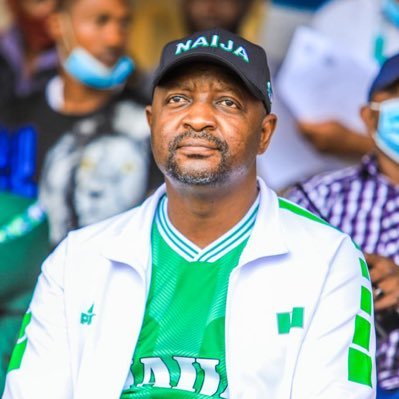Nigeria’s Minister of Youth and Sports Development, Sunday Dare’s blanket disapproval of Nigerian youths lacking in both digital and vocational skills and are unemployable has been described as an unnecessary push-back and indictment of the President Muhammadu Buhari-led administration for low scorecard in youth digital knowledge and skills acquisition.
A cross-section of Nigerians who spoke to Persecondnews expressed disappointment with Dare’s comment to the effect that Nigerian youths are unemployable because they lack digital and vocational or technical skills which they considered a primary responsibility of the government to empower them and make them employable.
Dare spoke against the backdrop of activities commemorating the 2021 International Youth Day on Channels TV programme, Politics Today.
The National Bureau of Statistics (NBS) had published a report that Nigeria’s unemployment rate since 2015 when Buhari took office has risen to 33.3 per cent with about 23 million Nigerians are unemployed.
One of the administration’s agenda is to at least reduce the country’s high unemployment rate to a single-digit through massive job creation.
About six years since Buhari administration came on board, Dare said: “We are trying a reset in the sense that emphasizes not just certificates, but that emphasizes skills- vocational and technical skills. That is the future of decent jobs by the International Labour Organization and the United Nations, the emphasis is making sure that we have technical and vocational skills.
“There are jobs out there that some of our graduates and young people cannot take up because these jobs are digital jobs. Unless you have this added advantage or digital skill, you cannot pick up these jobs.
“And that is why the focus right now is making sure that we provide our youths with the digital skills they need to compete. Even when you go out of the country, as a Nigerian youth, you are going to need this digital knowledge and skills.”
While admitting that infrastructural issues have also complicated Nigeria’s unemployment problems, Dare said: “Without giving any excuses, it is a function of resources. When you also go to other countries where you find unemployment stabilizing, maybe for a while, it is a collaborative effort on the part of the government, on the part of private corporations working together and on the part of international NGOs working together.
“On our part here you have seen the government trying to allocate resources. There are competing resources, it is a huge country 210 million people, and the youth form a large part of this population.’’
A retired banker, who simply gave his name as Alex, criticized the Sports minister’s statement, saying even without visible government’s effort in empowering the youths, many of them have embarked on training and retraining to acquire the digital skills and are doing well.
“I expect the minister to tell us what this administration has been able to do for the past six years on empowering youths with good skills that will make them employable.
“His comment shows that he and other ministers and officials of government are oblivious of the fact that it is their duty to change the narrative – it is not time for electioneering campaign and promises but to give us the direction and solutions,’’ he told Persecondnews.
For Ms. Lizzy Ubeku, who runs an NGO, it is embarrassing to hear the minister still talking about the problems and not the solution or the results.
“I read a report recently that unemployment rate has risen to 33.3 per cent in Nigeria which means the increasing youth population are unemployed or unemployable with the degrees given to them by the universities.
“This is very dangerous as we are sitting on a keg of gun powder. Already we can see that in youth restiveness and taking to crime and criminalities including cybercrimes.
“There should be proper and effective coordination among the three tiers of government for their programmes and offers from some countries and international organizations. The digital economy and the future belong to youths and therefore they should be given massive digital skills,’’ she said.
Persecondnews recalls that Vice-President Yemi Osinbajo (SAN) had in February 28, 2020 unfolded plans by the government to address skills gap, employability and reduce unemployment in Nigeria at the inauguration of National Council on Skills in Abuja.
Inaugurating the council chaired by Osinbajo, he said: “The present administration has really prioritized the skilling and employment of Nigerian youths and this is borne out of what we have in our Economic and Recovery and Growth Plan.
“We consider that vocational and digital technology skills are critical in the effort of this government not only to provide employment for our young people but also as an important feature of diversifying our economy.
“There is no question at all that one of the critical questions that come up all the time is the employability of our young men and women. It is becoming increasingly evident that it is not enough to have the certificate to compete favourably today.
“It is important that young men and women have requisite skills, technical and digital skills to enable them to find a place especially in the job market of this challenging 21st century.”
According to Osinbajo, the responsibilities and objectives of the council include formulating skills development policy and also layout plans and strategies for skills development in Nigeria.
“The council will direct the conduct of regular skills survey to identify the skills gap in the country so that training will be demand-based and to fast track the institutionalization of the National Skills Qualification Framework in Nigeria, and also to enforce legislation on the use of certified professionals in the country.
“The council will also bring coherence to skills development in the country by the facilitation of policy formulation,’’ he said, expressing the hope that the national council which is the highest decision-making body on skills development in Nigeria, will be a major step forward for us in our human resource development plan.
Also, the federal government said it was set to partner with the United Nations Children Fund (UNICEF) to empower 20 million Nigerian youths by 2030.
The initiative tagged “Generation Unlimited” and set to be inaugurated by Osinbajo targetting 20 million persons between the ages of 10 and 24.
Mr Peter Hawkins, representative of UNICEF in Nigeria, said the programme is aimed at developing the capacity of young Nigerians to be better positioned as leaders of tomorrow.
He said if the youths are not equipped with the right skills, especially in view of the ongoing digitization of the world, they would be unable to bring value to the future of Nigeria and turn them away from drugs or crime.
He explained that the initiative is also being replicated in many other countries with 1.8 billion young people targeted around the world.
“Nigeria has 65 million people between the ages of 10 and 24, so young people of Nigeria are more importantly the future. That generation would shape the future of Nigeria. What Generation Unlimited is trying to do is to first act as a platform between the government, the United Nations and the international community and the private sector.
“Out of the 65 million young people, Generation Unlimited is trying to help 20 million of those over the next 10 years to step over the generation that they are in to be able to meet their own ambitions and be valuable commodities in Nigeria.
“What is going to define the future of any country, particularly Nigeria, is the digital platform – access to data, access to digital information. It is not only expanding the digital platform but expanding young people’s access to that platform.
“There are initiatives like school-2-school connectivity, looking at how we can bring digital learning into the schools, communities and ensure that young peoples’ skills around digital platforms come to the fore,’’ Hawkins said.
However, a university don based in Lagos said what needs to be done is for the government to set its priorities right and fund adequately human capital development in the digital and vocational skills and not mouth it.
According to him, if the government can commit one-third of what goes into infrastructure such as roads and others into making our graduates employable by giving them market-demand skills acquisition, the country will be better for it.
“If the predictions about the Fourth Industrial Revolution are anything to go by, Nigeria should prepare for it and be a perfect example for digital transformation on the continent which will absorb millions of our youths.’’
The professor believes that Nigeria’s digital economy presents a unique opportunity for employment and job creation but said it would require robust government initiatives.
“There must be improvements in digital skills, literacy and soft skills training among young people,’’ he told Persecondnews.
The government says it plans to lower the access barrier to digital tools for citizens, setting a benchmark of 95% digital literacy rates to be achieved in the next ten years (2030) through States and LGAs support.
It is expected that through the policy young people will be equipped with the necessary skills to get decent jobs while transforming Nigeria into a leading digital economy.
Nigeria’s youth will be ready with strategic investments that support human capital development, create an enabling environment free from restrictive policies, tapping into the global ecosystem in ways that provide remote opportunities for local talent beyond our borders and attracting foreign tech players as well as advancing initiatives that encourage innovation within the digital ecosystem.
The Nigerian government recently unveiled “Nigeria Economic Sustainability Plan’’, placing emphasis on fostering a culture of innovation and creating a wide variety of technology and ICT jobs, focusing on the promotion of technology hubs, call-centres for business process outsourcing, and digitisation of processes – both in Government and the private sector.
The Plan also seeks to foster new ways of working, producing, learning, and managing public health and safety in the years to come.
This includes building resilience across critical sectors and supporting the creation of jobs for youth through training specifically in digital skills to better prepare them for employment in technology sectors.
A closer look at the digital sector reveals an overwhelming skills gap based on competencies assessed in three sub-sectors – Software Development Digital Analysis and Network & Cybersecurity.
























Leave a comment